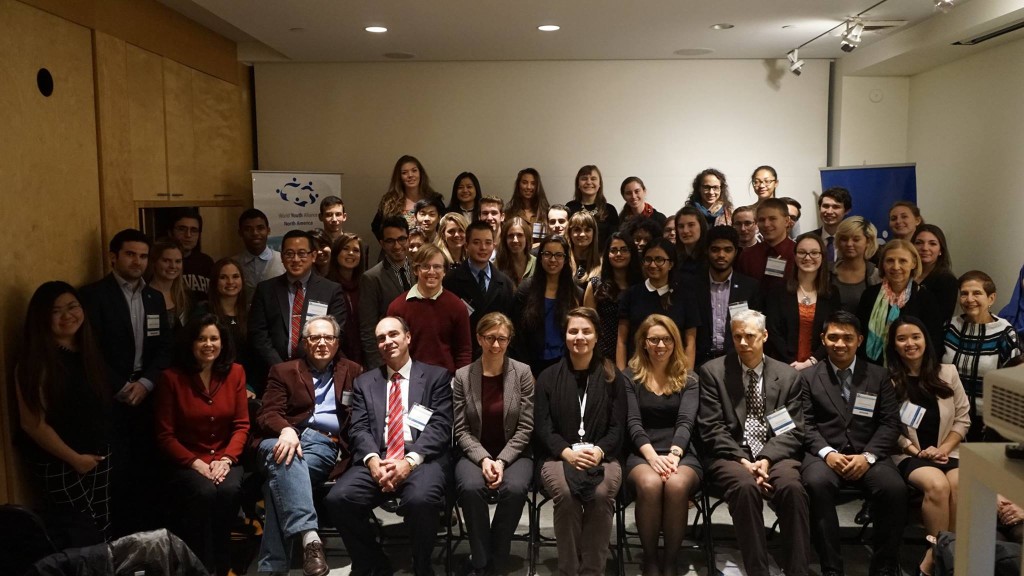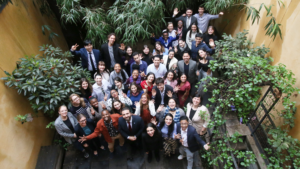As I huddled at the back of the room with a donated cup of coffee, I was taken aback by the sixty young people packed into rows of chairs, listening intently to a talk by founder Anna Halpine about the reason for the World Youth Alliance. According to our culture, this isn’t supposed to be possible. Young people are supposed to enjoy selfies and pumpkin spice lattes, not self awareness and purposeful Saturday lectures. And yet, there they were, scribbling intently into their notebooks and drinking in the insights that come with almost 17 years of fighting for a vision of the human person that sees all as sharing in intrinsic dignity.
As an intern, I’d like to think that I have a unique outlook on the Emerging Leaders Conference (ELC). I first joined the organizing team for the ELC in June. Then, the work centered mainly on finding speakers, inviting participants, and identifying sponsors. As November neared, the pieces pulled together, and suddenly the conference was upon us. It seems it was over just as quickly, but it didn’t pass without some incredible moments. I’d like to take a page to reflect on this time we shared with so many young leaders from across the region.
The conference featured a number of talks by leading professionals in the region.
I found Dr. Nathanson’s discussion of the force with which ideology has penetrated academic discussion for quite some time to be quite poignant. I can indeed relate to this, as I attend a university where most of my peers and professors are liberal and I, too, am assumed to be liberal until proven otherwise. Some conversations, such as “What is empirically good women’s health care?” simply cannot happen in such a context because all the ideologies are in the way. And this isn’t just about liberalism; As a Southerner, I can say that conservative ideologies can be just as barring from real discussion. Until we find a way to talk—not as liberals, communists, conservatives, socialists, moderates—as people, we won’t ever be able to solve the region’s problems.
Next up was Dr. Bauerline. What was striking to me about his talk on the decline of appreciation of classical culture—music, books, films—by young people is that once he finished, the question arose: “What do you suggest we read/watch/listen to?” It immediately became clear that this group of young people was already doing whatever they could to better the culture of their time. What could be more powerful, given what we’re up against?
Somewhat ironically, given the subtitle of Dr. Bauerline’s book (Or, why you shouldn’t trust anyone under 30), the best talk of the weekend was given by WYA’s own Director of Education, Weronika Janzcuk. As part of WYA’s mission to make the voices of young people heard, Weronika is indeed under 30. Yet, she beautifully synthesized the entire conference, simultaneously pulling from philosophical and historical readings and telling her own WYA story. She and WYA President Lord Pomperada wrapped up the conference on Sunday with a call to action…and it worked better than I’ve ever seen a call to action work in my life. Students were stepping up left and right to start chapters, begin the Track A Training, and grow the membership of existing chapters.
The Emerging Leaders Conference was nothing short of inspiring. I was privileged to be a part of the planning efforts, and even more so to be present on the day of. There is something incredible happening at WYA North America, and each time we host an event like this, the fire catches a bit more across the region. I have no doubt that those who attended will be back for more. After all, why wouldn’t they? 🙂
Read more about the 6th WYANA ELC and see photos from the event.
Written by Carissa Tinley, a current WYANA intern from New York University.








